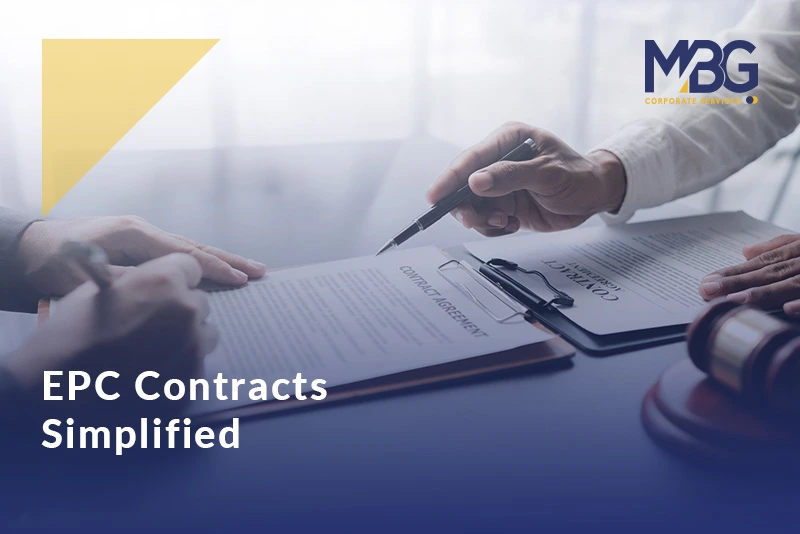EPC Contracts: Framework, Challenges, and Strategic Insights

What is an EPC contracts?
EPC Contracts (Engineering, Procurement, and Construction) are turnkey agreements where a single contractor takes full responsibility for designing (engineering), procuring all materials and equipment (procurement), and building the project (construction). Under an EPC contract, the contractor delivers the project in a ready-to-use condition, within a fixed cost and timeline, and ensures proper contract management support are in place for performance guarantees. such as efficiency, safety, and output. For the employer, this arrangement offers one point of accountability and reduced risks, as the contractor bears responsibility for delays, cost overruns, or performance failures.
Legal and Commercial Framework:
EPC contracts in India are governed by the Indian Contract Act, 1872 and rules from FIDIC (International standard contract forms used in construction)-based clauses. These contracts typically include stringent terms on liquidated damages, performance guarantees, force majeure, and Counsel Assistance for arbitration. The pricing model is generally lump sum, meaning the contractor commits to complete the project within a pre-agreed cost, regardless of actual expenses incurred.
Key clauses to include in EPC Contracts
There are significant clauses requiring abundant caution while preparing an EPC contract in order to priorities interest of all the parties involved in the contract:
- Scope of Work: Contractor to deliver complete EPC services (design, supply, erection, testing, commissioning) on a turnkey basis as per specifications.
- Single Point Responsibility: Contractor solely responsible for execution and performance; Employer bears no interface risk.
- Contract Price: Fixed lump-sum; no escalation; covers entire scope regardless of actual costs.
- Time for Completion: Works to be completed within agreed schedule; time is of the essence.
- Performance Guarantees: Contractor ensures specified output and efficiency; shortfalls attract damages or rectification.
- Defects Liability: Contractor liable for defects for 12–24 months post-completion.
- Dispute Resolution: All disputes shall be referred to arbitration in accordance with the Arbitration and Conciliation Act, 1996, with the seat and proceedings in English.
Challenges in EPC Contracts Execution
The execution of an EPC (Engineering, Procurement, and Construction) contract is a multifaceted process that often faces significant hurdles across its lifecycle. These challenges can affect timelines, budgets, and the overall success of a project. Below are some of the most pressing issues encountered during EPC contract execution:
1. Site Selection for EPC Contracts:
Identifying and acquiring a suitable project site is one of the earliest yet most difficult tasks. The availability of land is becoming increasingly limited, especially in high-demand areas. Rising land costs, legal complications surrounding land ownership, and competition from other developers contribute to delays and resource wastage. Additionally, unsuitable site conditions such as unstable soil, environmental sensitivities, or inadequate infrastructure can further complicate development, requiring costly redesigns or even relocation.
2. Material Procurement:
Many EPC projects depend heavily on imported construction materials, particularly for specialized equipment and components. This dependence introduces several risks:
- Price volatility due to global market fluctuations
- Delays caused by geopolitical tensions or customs regulations
- Supply chain disruptions, such as those experienced during pandemics or shipping crises. Such uncertainties make budgeting more complex and can lead to project cost overruns or missed deadlines if alternative suppliers or local substitutes are not readily available.
3. Labour Availability and Management:
Labour-related issues are increasingly critical in EPC execution. The construction workforce in many regions is aging, with fewer young workers entering the trades. This shortage of skilled labour leads to:
- Compromised quality of work
- Extended timelines due to lower productivity
- Higher labour costs due to demand-supply imbalance. Moreover, managing a large, often multicultural and subcontracted workforce poses challenges in communication, safety compliance, and productivity monitoring.
4. Technology Adoption:
Despite advancements in construction technology such as Building Information Modeling (BIM), drones, AI-powered scheduling, and digital project management tools, many EPC contractors are slow to integrate these innovations. Reasons include:
- Resistance to change or lack of technical expertise
- Upfront costs of implementation
- Fragmented systems that don’t integrate well. This lag in modernization leads to inefficiencies, data silos, delayed decision-making, and missed opportunities for optimization.
5. Regulatory and Environmental Compliance:
The regulatory environment for infrastructure and construction projects is becoming increasingly stringent. EPC projects must comply with a wide range of:
- Environmental regulations (e.g., pollution control, waste disposal)
- Labour and safety laws
- Zoning and land use restrictions
- Permitting processes: These regulations often vary across jurisdictions and are subject to change, adding layers of complexity. Non-compliance can result in project stoppages, legal penalties, or reputational damage.
How MBG Can Help with EPC Contracts?
Successfully managing an EPC contract requires a proactive approach to these challenges. Early-stage planning, robust risk management, stakeholder coordination, and investment in technology and workforce development are key to navigating these obstacles and delivering. Accordingly, assistance from experts like us is pretty significant.
- Assistance in Pre-bidding process such as preparation of Request for Proposals (RFPs).
- Advisory on mitigating risk associated with the successful challenges that one may encounter in implementation of EPC.
- Drafting of EPC contracts as it requires to be adequately drafted in order to protect the interest of employer and contractor.
- Ensuring the contract complies with local laws, environmental regulations, labour rules, and international standards, with corporate governance and compliance advisory from experts.






